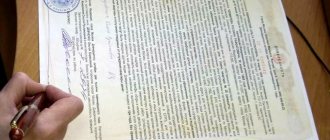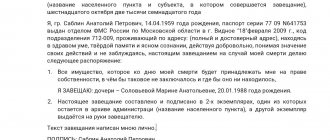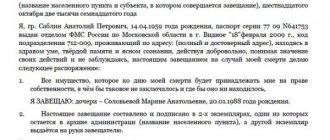People who own property (including real estate) often think about how to draw up a will without a notary so that it has legal force. This question arises when it is impossible to visit a notary’s office. The law provides that a citizen has the right to write an order without a notary certificate. But such paper has special requirements that must be taken into account. An incorrectly executed document can be easily challenged in court and declared invalid.
Why do you need a will?
A will is a written document that allows a person to legally determine how his or her property will be disposed of after death. The act of expression of will comes into effect after the opening of the inheritance. Issues of its writing and execution are regulated by the Civil Code.
If a will is not drawn up, then the property passes to the heirs in the manner prescribed by law. This means that they receive inherited property in equal shares according to the established order.
Ignoring the procedure for drawing up such an order can result in problems for the relatives of the deceased.
A will is drawn up for the purpose of:
- Determine the circle of persons (relatives or not) who will receive the inheritance after the death of the testator.
- Specify the list of property due to heirs.
- Establish the share of each of the applicants in the total inheritance.
- Outline the conditions for receiving an inheritance.
In general, the law requires mandatory notarization, otherwise the act of expression of will is considered invalid. The notary’s task is to verify the testator’s legal capacity and compliance of the terms of the document with Russian legislation. But there are exceptions. They arise in special conditions when it is necessary to ensure the exercise of the rights of a capable person to determine his will regarding the disposal of his property after death, and the opportunity to do this with the participation of a notary is limited.
Wills are divided:
- certified by a notary;
- equivalent to notarized;
- drawn up without the participation of a notary.
Fulfilling the requirements for drawing up a testamentary disposition will allow you to avoid troubles associated with recognition of its validity. You should learn in advance how to draw up a document correctly.
Who has the right to make a will?
The legislation puts forward requirements for the testator, failure to comply with which will render the document invalid:
- age of majority: a child under 18 years of age cannot dispose of property even if he is its owner;
- capacity;
- the existence of a right to property that is inherited;
- mental health at the time of drawing up the will, understanding the consequences of the actions taken;
- voluntary disposal of one's property;
- personal drawing up of a will: you cannot entrust this matter to a third party, even with a notarized power of attorney.
When drawing up a will, it is necessary to take into account the right of some persons to an obligatory share in the inheritance . You have the right to apply for it:
- disabled children of the testator, his children under 18 years of age;
- disabled mother and father, husband/wife;
- disabled dependents.
The size of the obligatory share is at least half the share that these persons would receive upon inheritance by law, without a will.
Who can be a testator
All individuals of social maturity can bequeath personal property. For this, a person must be:
- Adult. Minor citizens have the right to make a will from the moment of marriage or emancipation (declaring the minor legally competent). The latter is carried out by decision of the guardianship and trusteeship authorities for a child over 16 years old who works under an agreement, contract or is engaged in business.
- Capable. The legal basis for recognizing incapacity can only be a court decision. You can doubt a person’s capacity based on indirect signs (for example, incoherent speech, trembling of hands, obvious absurdity of the content of the document). If it turns out that a person, being legally capable, at the time of writing the act of expression of will was not able to control and regulate his actions, then the legality of the document can also be challenged.
Recognition of a citizen as incompetent or partially capable after the fact of making a will does not affect the result of assessing its validity.
Who is recognized as a testator?
A testator is a person who, according to Article 1118 of the Civil Code of the Russian Federation, falls under the following criteria:
- age at least 18 years;
- capable If the court decides that a person is partially or completely incompetent, he cannot draw up a testamentary document. This is due to the fact that such a person is not aware of his actions and cannot make an adequate decision.
- is a citizen of the Russian Federation.
If each of the points is met, a person can write a will at any time. You can also rewrite the document by changing your expression of will at any time.
Is it possible to make a will without a notary?
It is possible to write a will without a notary that will be legally valid in cases regulated in the Civil Code:
- When making closed testamentary dispositions. Closed wills are understood as wills that testators draw up personally without the presence of strangers in secrecy. They are drawn up in handwritten form; the use of printed media is not acceptable. Such a document in a single copy, sealed in an envelope, in the presence of two witnesses, is handed over to a notary for safekeeping. All responsibility for the correctness and literacy of the content falls on the testator.
- There is no notary at the testator's location. This situation is typical for small settlements where notary offices are not organized, as well as places of military service and prisons. The list includes vessels at sea and areas where exploration expeditions are being conducted.
- There is an increased threat to the life of the testator. Finding a person in the epicenter of natural disasters and military operations poses a serious risk. In such circumstances, it is possible to draw up papers without the participation of a notary.
- The physical capabilities of a citizen who wishes to make arrangements in the event of death are limited. A document drawn up while a person is in a medical institution, nursing home, or sanatorium has legal force.
- It is assumed that one or more bank deposits will be inherited. A testamentary disposition regarding the inheritance of funds is drawn up in the bank where they are deposited.
In the absence of a notary in the above circumstances, documents certified by authorized persons are considered legal.
Pros and cons of handwritten or printed paper without notarization
Drawing up a will without a notary has the following advantages:
- independent determination of the list of heirs, even when they are not relatives;
- eliminating property disputes among potential heirs (how to draw up a will so that it is not disputed?);
- execution of a legally binding document in emergency situations and places where there is no access to a notary;
- the possibility of the last expression of the will of a dying person;
- fast document processing;
- the ability to compile in open and closed form while keeping the content secret.
It should be noted the disadvantages of such a document:
- the contents of the document cannot be verified by a notary or other specialist, which often leads to incorrect spelling;
- all responsibility for the legality of the contents (registration of compulsory heirs, ownership of property, etc.) falls on the testator;
- the need for heirs to prove in court the fact of an emergency;
- more frequent challenges to the legality of a document in court by other relatives (heirs at law);
- the need to re-register with a notary within a month after the end of the emergency.
Important. Knowledge of the law and correct drafting of the document helps the heirs avoid problems.
Who can certify a will?
The norms of the Civil Code of the Russian Federation clearly list the entities that can certify wills. This gives acts of will a legitimate status.
Depending on the situation, the persons certifying the will are:
- heads of local government bodies, specialists of the compulsory health insurance service (CHI) - in settlements where there is no notary office;
- chief doctors, their deputies, performing duties under the relevant order, doctors on duty - in hospitals and other medical institutions;
- directors, doctors on duty - in boarding schools, nursing homes;
- captains - on Russian ships;
- commanders of military units;
- heads of places of serving sentences;
- heads of field bases and expeditions;
- authorized employees - in banking institutions;
- when drawing up an administrative act in force majeure conditions, it will be witnessed by two people chosen by the testator at random.
Documents certified by the listed entities will be valid if the testator was in the specified place at the time of their execution.
Legal features of a will
A will is a unilateral transaction that does not require the consent of third parties, including other heirs who may claim inheritance by law. The entry into force of a will, giving rise to certain rights and obligations for the heirs, begins from the moment the inheritance is opened, after the death of the testator. The Civil Code of the Russian Federation defines the following rules for drawing up a will:
1. The will is personal in nature:
- a will can only be made in person; the involvement of third parties, including legal representatives, is not allowed. That is why only legally capable adult citizens, who have been recognized by law as having the right to dispose of their property, can bequeath their property;
- the document must be signed by the testator himself. There are exceptions - a will can be signed by another citizen in the presence of a notary at the request of the testator due to his physical disabilities, about which an appropriate entry must be made in the will by an authorized person.
2. A will is strictly formal in nature: The document must be certified by a notary or other authorized person, who is obliged to explain to the testator his rights and obligations regarding the drawing up of a will.
3. A will, as a legal document, has the status of an administrative transaction with special content:
- the document must contain specific instructions regarding the property and the establishment of the circle of heirs;
- the testator has the right to bequeath property to any person with the determination of the share of the inheritance in any way;
- heirs under a will can be individuals, private companies, the state and even international organizations;
- the testator has the right to disinherit one, several or all heirs by law, without voicing the reason for such an action;
- the testator has the right to cancel and change the will at any time, as well as dispose of any property, including those that he acquires in the future;
- the testator is not obliged to inform anyone about the contents of the will, nor about any changes in it;
- in turn, authorized persons, as well as a translator or executor of a will, do not have the right to disclose information about the inheritance until it is opened.
If the secrecy of the will is violated, the testator has the right to demand compensation for moral damage in court.
Drawing up a will without a notary
When drawing up a will without notarization, no form is required. It is enough to adhere to the requirements:
- the document is drawn up manually or on a computer;
- the testator writes the text independently or his instructions are recorded by an authorized official;
- if the document is drawn up according to the words of the testator, then the latter must read it before signing;
- if the will-maker does not have the opportunity to personally read the text, then the official reads the document out loud.
The testator has the right to amend or cancel the act of expression of his will, drawn up without a notary.
Documents to be drawn up
To correctly draw up a testamentary disposition, the following is required:
- testator's identity card;
- list of subjects - intended successors of the inheritance estate.
The execution of wills without the participation and certification of notaries can be carried out in the absence of title documents for the property. It is enough to provide the wording in the text: “I bequeath all movable and immovable property that will belong to me on the day of death.”
When registering a document, you do not need to pay a state fee. Typically, material costs consist of the cost of notary services for its registration (from 1,000 rubles/page) and certification (from 100 rubles). Any attempt by authorized persons to collect fees is illegal.
Form
All such documents, in order for them to acquire legal force, must be in writing. This especially applies to the inheritance of real estate, apartments, securities, and cars. Personal belongings, household items, and small amounts of money can be transferred by verbal agreement.
Using a sample to write a will without the participation of a notary will help eliminate errors in the execution.
Compilation rules
In order to avoid conflict situations between successors, the type of will in question is drawn up according to the following mandatory rules:
- The document provides the necessary details.
- The text must be clearly formulated and reflect in detail the last will of the person.
- Errors and typos are not allowed.
The likelihood that a correctly executed document will not be recognized is low.
Content
Wills without notarization include:
- name of the document being drawn up;
- information about the place and date of registration (in words);
- in full - last name, first name, patronymic of the testator;
- accurate information about the composition of the inheritance mass;
- reliable information about the intended successors;
- number of issued copies;
- a record that the document was drawn up personally by the testator without coercion;
- signatures of the testator, witness and two witnesses.
The execution of wills for apartments without notary services does not differ in form and the presence of mandatory details from will documents regarding other valuable property. There must be information about the exact address of the property, its area and the number of rooms to be inherited. Indicate what part of the property goes to each of the receivers.
Basic provisions
Before drawing up a document, it is advisable to contact a lawyer. It is necessary to find out changes in the legislative framework and include the necessary provisions in the will. Usually this responsibility is assigned to the notary.
- Two copies are prepared at the same time.
- There is a name, number and place of registration.
- The last name, first name and patronymic of the testator are indicated in full along with passport data (time of issue, registration address).
- Information about heirs is presented similarly.
- There is information from title documents.
- The number of copies, personal compilation and method of storage are reported.
- Below are the signatures of the testator and two witnesses.
Important! Handwritten text has priority, since it is possible to conduct a handwriting examination. Witnesses will be able to confirm the independent drafting and good will of the testator.
A testamentary disposition will help distribute funds in bank accounts. Use a regular form or a special form from a financial institution. There are no special differences compared to a typical will. Indicate data on deposits and the size of the share as a percentage.
Additionally, there is a position, as well as the name of the bank employee. They put down the filling number, signatures (testator and manager), and seal. Notarization is not required.
Special cases
There are situations in which a special procedure is required for drawing up and authenticating a document containing a person’s last will. These include life-critical situations and the management of money stored in a bank account.
Bequest of funds deposited in a bank
To express the will regarding the inheritance of money stored in the bank, the testator should draw up an order in the branch where the deposit(s) was opened. The bank is obliged to accept wills free of charge.
A document drawn up at a bank institution will have legal force if it is drawn up and certified in the following way:
- the will is drawn up in two copies, each of which is signed by the testator and an authorized bank employee, certified by their seal;
- The order is certified only by the representative of the bank who has the rights to accept for execution the client’s will in relation to the funds in his account;
- one of the copies is transferred to the testator of the funds, the second is registered in the Book of Testamentary Dispositions and filed in a folder for storage.
If the will in the bank is drawn up correctly, it acquires the force of a notarized document.
Will in critical situations
Registration of the last expression of will of people who are in the epicenter of force majeure situations must occur upon fulfillment of the requirements noted in Article 1129 of the Civil Code of the Russian Federation:
- The text of the document is written by hand;
- The registration procedure is carried out in the presence of two witnesses.
If the testator survived in the conditions under consideration, then he needs to notarize the written order within 30 days after its end. Otherwise it is considered invalid.
Can I create a handwritten or printed document myself?
The testator has the right to write a will without notarization only in special circumstances:
- First of all, this applies to citizens located in places where there is no notary. In this case, Article 1127 of the Civil Code of the Russian Federation establishes a list of persons who can certify a document instead of a notary.
- The second important reason for allowing the execution of a will without a notary is related to the danger to life in emergency circumstances (for example, an earthquake or combat).
In this case, the document is certified by 2 witnesses with their signatures (Article 1129 of the Civil Code of the Russian Federation). Such a will has legal force upon the death of the applicant or within 30 days after the end of the emergency situation. If a citizen has gone through all the difficulties, then he is obliged to notarize the document after the specified period. Otherwise it becomes invalid. The heirs will have to establish their rights in court by proving the fact of extraordinary circumstances. - Finally, there is another option for a will drawn up without the participation of a notary - a closed will.
It is written exclusively by the testator and sealed in an envelope without disclosing the contents, but in the presence of 2 witnesses. The envelope with the document is handed over to the notary (also in the presence of witnesses), who packs the closed will in a second envelope and certifies the fact of its delivery. Its storage is ensured in the notary's office.
Important. According to Article 1124 of the Civil Code of the Russian Federation, a will must be drawn up in writing. The law allows it to be written in printed or handwritten form. Accordingly, a will without a notary can be drawn up in any way. The exception is a closed will, which is written by the testator himself and only with a ballpoint pen. Handwritten text is needed to be able to identify handwriting.
It should be taken into account that when drawing up other wills without a notary, a handwritten form is desirable. If legal proceedings and doubts about authorship arise, handwriting examination will be able to clarify things.
What wills are equivalent to notarized wills?
Article 1127 of the Civil Code of the Russian Federation and comments to it define 5 types of wills that are equivalent to certified ones. The testator draws up such an act in person with the obligatory presence of witnesses, as well as authorized persons of the witnesses.
Wills equivalent to those certified by a notary:
- compiled while staying at a hospital inpatient facility, as well as in a nursing home: certified by the head physician, manager, deputy, doctor on duty;
- when sailing on a ship of the Russian Federation: certified by the captain;
- expeditions for various purposes: signed by the leader;
- a military person or a civilian located in a military unit: certified by its commander;
- convicts serving a sentence: signed by the head of the correctional institution.
A testamentary document executed in one of the indicated ways is signed in the presence of a certifying representative, a witness and a witness. At the earliest opportunity, the certifier submits the document to the notary authorities. Optimally - preferably at the place of residence of the testator.
In accordance with Art. 1127 of the Civil Code of the Russian Federation, the following documents cannot be certified by the listed methods:
- inheritance agreement;
- joint testamentary disposition of the spouses.
If the testator expresses a desire to invite a notary to certify his will, then the authorized person, if possible, is obliged to do this.
Important concepts of a testamentary document
Before you understand how to draw up a will without a notary, you need to understand the basic legal concepts that will be needed when writing the document:
According to the law, a will is a notarial document that has a unilateral order: the testator distributes the estate to one heir or several persons, in different or equal amounts. The document comes into force only after the death of the testator.
Expressing your will on paper is not difficult. It is important to describe in detail what condition is being transferred, to whom and in what amount.
If after the death of a person there is no will, the inheritance is distributed in equal shares according to the order established by the law of the Russian Federation.
Inheritance is the movable and immovable property of the testator, which after his death will be distributed among his successors for use.
The important fact is that after drawing up the document, you cannot make any transactions that involve the alienation of the property specified in it. Otherwise it will be declared invalid.
A testator or testator is a person who decides to distribute his property during his lifetime. He can designate one or more people as heirs, distributing the fortune in any proportions. In addition, the testator, at his own will, can deprive the right of inheritance of some persons, except for those to whom the share must be bequeathed.
He also has the right to appoint an executor, who, after his death, will supervise the execution of the will.
An heir is a person to whom real estate is transferred by order of the testator. This can be one or more people at the same time. Heirs can be both relatives and friends, and other persons to whom the testator decided to leave a share of his fortune.
If the document contains inaccurate or ambiguous information, they can challenge it in court. In this case, the court will be guided not only by the provisions of the will, but also by the legislation of the Russian Federation.
Entry into inheritance under an uncertified will
A testamentary disposition not certified by a notary or authorized persons has legal force in the case where the execution took place in extreme, life-threatening circumstances (military actions or natural disasters) in which the death of the testator occurred. Entry into inheritance under such an act can take place in one of the following ways:
- without a trial, when all heirs agree with the will of the deceased;
- through a lawsuit if the heirs have doubts about the authenticity of the document.
In case of a controversial situation, the heirs must prove the following facts in court:
- when writing a testamentary disposition, there were extraordinary conditions that limited the opportunity to resort to the services of a notary;
- the testator personally wrote the will without any pressure on him.
In the future, entry into inheritance by testamentary disposition, the authenticity of which has been confirmed in court, occurs on a general basis.
In all other conditions, except those considered, a document drawn up in handwritten form and not notarized has no legal force.
In what situations will it be valid?
A document is recognized as legal in the absence of certification by a notary or other persons specified by law, only in situations where the life of the owner of the property is in danger and there is no possibility of contact with authorized persons. The following emergency situations are distinguished:
- natural disasters;
- man-made disasters, traffic accidents, transport accidents;
- war zone;
- a sharp deterioration in health, a near-death state.
The court may recognize other emergency situations when a person has no other opportunity to exercise his last will.
Attention. The document will be recognized as legal if drawn up or sealed in the presence of 2 witnesses who confirm this fact with their signatures. It is important that the adult testator is fully conscious and has legal capacity.
Period of validity of the declaration of will
A properly executed testamentary instrument becomes valid after the death of the testator. The following time characteristics are important for its implementation:
- The heir, within 6 months from the day following the day of death of the testator, may decide to enter into the inheritance or refuse it.
- If the six-month period is missed for valid reasons, the heir can restore it within 3 years. This period is counted from the moment when the heir no longer has a reason preventing him from assuming inheritance rights earlier.
The last will of the deceased, drawn up in the form of a will, including without its certification by a notary, has no limitation on the validity period.
Will. What do you need to know?
For most citizens, the decision on the fate of their property is not indifferent: how can they best manage it so that their loved ones do not subsequently have conflicts when dividing it? At a notary's appointment, the following questions are often asked: is it better to bequeath or donate, to whom and what can be bequeathed, who can receive a share in the bequeathed property, and some citizens have the opinion that a will can be challenged, but a donation cannot.
So, what do citizens who want to leave a testamentary disposition need to know?
The current legislation contains a definition of the concept of a will. According to Article 1040 of the Civil Code of the Republic of Belarus, a will recognizes the will of a citizen to dispose of his property in the event of death. A will is a unilateral transaction, the validity of which is determined at the time the will is made.
Only capable citizens have the right to make a will, i.e. from the moment of reaching 18 years of age. Heirs can be citizens who are alive at the time of opening of the inheritance, as well as those conceived during the life of the testator and born alive after the opening of the inheritance, legal entities created before the opening of the inheritance and existing at the time of opening of the inheritance, as well as the Republic of Belarus and administrative-territorial units. To make a testamentary disposition, a counter-will of another person is not required.
To certify a will, a citizen must personally come to the notary's office with an identification document. If a citizen, due to illness or other valid reasons, cannot appear at a notary’s office, a notary may be invited to certify the will at his location, for example, in a hospital or at home.
The will can be written by the testator in his own hand or recorded by a notary from the words of the testator in the presence of a witness.
Strict requirements are imposed on the form of the will, since failure to comply with the form of the will entails its invalidity. The will will be executed after the death of the testator and no corrections can be made to the incorrectly executed document.
A will can only be certified by a legally capable person.
The notary will definitely talk with the testator without outsiders - to clarify his actual will, to eliminate possible pressure on him, and explain his rights and obligations.
In accordance with Article 1044 of the Civil Code of the Republic of Belarus, a will must be drawn up in writing and certified by a notary, indicating the time and place of its preparation. The following must be indicated: surname, first name, patronymic, date of birth, personal (identification) number, place of residence of the testator, full name of the heirs. As a rule, in addition to the surname, first name and patronymic of the heir, the will indicates the degree of his relationship with the testator, if any, and date of birth. The text of the will must accurately reproduce the will of the testator; expressions containing contradictions and different interpretations should not be allowed in its text; there should be no erasures or additions.
If the testator cannot sign the will with his own hand due to illness, illiteracy, etc., then at his request, in the presence of a notary, another person can sign. If the testator is illiterate, the notary will read the will out loud to him, making a note about this in the text of the will.
If a notary draws up a will from the words of the testator in the presence of a witness, he will check his legal capacity and explain which categories of citizens cannot be witnesses and also cannot sign the will in place of the testator, namely: a notary or other person certifying the will; the person in whose favor a will has been drawn up or a testamentary refusal has been made, the spouse of such a person, his children, parents, grandchildren and great-grandchildren, as well as other heirs by will and by law; citizens who do not have full legal capacity; illiterate; persons with a criminal record for giving false testimony; citizens with such physical disabilities that do not allow them to fully understand the essence of what is happening; persons who do not sufficiently speak the language, with the exception of cases where a closed will is accepted by a notary.
Documents confirming the testator's right to the bequeathed property are not verified by a notary.
The will is certified in two copies, one of which is kept in the notary’s files, and the other is handed over to the testator.
At the request of the testator, the will can be certified by a notary without familiarization with its contents (closed will). The contents of a closed will are hidden from other persons, even from a notary. The essence of a closed will is that it must be handwritten and personally signed by the testator. Therefore, citizens who cannot write a will with their own hands do not have the opportunity to draw up a closed will. The closed will in an envelope is transferred by the testator to the notary in the presence of two witnesses who put their signatures on the envelope. When accepting such a will, the notary explains to the testator who has the right to the obligatory share and warns about maintaining the secrecy of the will.
A closed will has not yet become widely used and is very rarely certified by notaries.
Freedom of will is expressed in the fact that the testator can make any order of his own choice. The main thing is that it does not contradict current legislation and does not violate moral standards accepted in society.
Let's look at some points in more detail. The testator has the right:
distribute property to specifically specified heirs in any shares, both those included and not included in the circle of heirs by law;
distribute property between the heirs in any way and determine the shares of the heirs;
bequeath all property or only part of the property (the testator indicates “all my property that will belong to me on the day of my death, wherever it is located and whatever it consists of” or a citizen has the right of private ownership of a residential building and apartment, which he can bequeath, and the residential building will be inherited by law;
disinherit one, several or all heirs by law (you can directly indicate in the text that a specific heir is deprived of the right to inherit, or simply remain silent about the heir), however, it should be noted that disinheritance of heirs by law does not apply to his descendants, heirs by right of representation, unless otherwise specified in the will;
to assign an heir to both the heir by will and the heir by law in cases where the heir or heir by law appointed by him in the will dies before the opening of the inheritance or at the same time as the testator, or after the opening of the inheritance, without having time to accept it, or does not accept the inheritance, refuses from him, will not have the right to inherit, will be excluded from inheritance by a court decision as an unworthy heir;
make an order regarding the property, the owner of which he can become on the day the inheritance is opened (he is still planning to purchase an apartment);
appoint an executor of his will expressed in the will (executor);
impose on one or more heirs by will or by law the fulfillment at the expense of the inheritance of obligations of a property nature in favor of one or several persons (the testator has the right to impose the obligation to provide another person with lifelong use of residential premises and such right of lifelong use remains in force, even if the owner of the residential premises subsequently changes, this right cannot be alienated and it is not the basis for the legatee’s family to live in the specified residential premises;
impose on the heir (heirs) by law or will the obligation to perform any action of a property or non-property nature aimed at achieving a generally beneficial goal - assignment (for example, to transfer to a museum a collection of paintings that belonged to the testator or to keep and care for animals belonging to the testator, etc. .P.).
A citizen, making testamentary dispositions, canceling, changing in whole or in part, or drawing up a new will, can do this without notifying or explaining the reasons to the interested parties.
Freedom of testament is limited by the rules on compulsory share in inheritance. According to Article 1064 of the Civil Code of the Republic of Belarus, minor or disabled children of the testator, as well as his disabled spouse and parents, regardless of the contents of the will, inherit at least half of the share that would be due to each of them upon inheritance by law. In this case, the heir to the obligatory share must be a minor or disabled on the day of the testator’s death. Disabled people include citizens who have reached retirement age or are disabled. Let's give a simple example: the testator had two minor children, he bequeathed an apartment to a stranger, therefore two minor children will receive certificates of the right to inheritance according to the law for 1/4 share each in the specified apartment, and for 1/2 share a certificate of right will be issued for inheritance under a will.
In accordance with Article 1049 of the Civil Code of the Republic of Belarus, the testator has the right at any time to cancel the will he made as a whole, or change it by canceling, changing, or supplementing individual testamentary dispositions contained in it, making a new will.
Complete cancellation of a will can be done in two ways: by drawing up a new will or by destroying all its copies. You cannot destroy a will simply by tearing it up or crossing it out, since after the opening of the inheritance the heirs will receive a duplicate of the will kept by the notary.
The will is subject to execution after the death of the testator.
A will may be declared invalid in court at the suit of interested parties whose rights and interests have been violated after the opening of the inheritance, if it is proven that:
the will was made by a citizen who is incapable of understanding the meaning of his actions or managing them;
under the influence of deception, threat, violence, malicious agreement;
committed by a citizen whose legal capacity has been limited by a court;
committed by a citizen involuntarily due to a combination of difficult circumstances under extremely unfavorable conditions for him.
For certification of a will, a notary fee in the amount of 1 basic unit is charged. Citizens who have been assigned a pension in the Republic of Belarus, disabled people of groups I and II will be exempted by 50% from paying the notary fee for certificates of wills, upon presentation of a document confirming the benefit. If the will is written by a notary, then 20% of the base amount is charged for drawing up and preparing a draft will.
Challenging a self-executed will
A will, regardless of whether it was drawn up independently or with the participation of a notary, can be challenged. If citizens believe that there are grounds to recognize a document reflecting a person’s will as invalid, they have the right to go to court to provide evidence of this point of view.
Grounds for challenge
A self-executed document reflecting the wishes of the will-maker who has died can be challenged:
- according to the circumstances under which the testamentary disposition was drawn up and certified (for example, if the opportunity to contact a notary was not used);
- essentially - controversial positions in the text regarding the size and share of inherited property, the exclusion of someone from the number of heirs, and more.
It may be necessary to prove the fact that the person freely expressed his will in the will.
Declaration illegal
If during the trial in court a decision is made to accept the evidence provided by the plaintiffs, then the act of expression of will drawn up without the participation of a notary is considered illegitimate. In the future, the procedure for inheriting the property of a deceased citizen occurs according to the law. Judicial practice shows: despite the fact that a will that is not notarized has legal force, the heirs are forced to go through legal proceedings.
A capable and adult person is entitled to draw up a will by hand without a notary in some situations regulated by the Civil Code of the Russian Federation.
A circle of persons has been determined who, under specific circumstances, may have the authority to act as witnesses and witnesses to this act of expression of will. Strict adherence to the rules regulated by law will avoid mistakes and eliminate the possibility of challenging it in court. Order a free legal consultation
Documentation content requirements
The disposition of acquired property places demands on the testator. A will without a notary should:
- indicate recipients and unworthy heirs;
- list objects of inheritance;
- divide property into shares without infringing on the rights of persons from the first priority;
- establish the conditions of transfer and deprivation (by law);
- set tasks and give recommendations for implementation.
Attention! Finally, a note is made about the writing method. If it is not possible to prepare the document personally (physical ailments, illiteracy), a hand-applying person is selected. In this capacity there is an independent person who does not claim inheritance.






